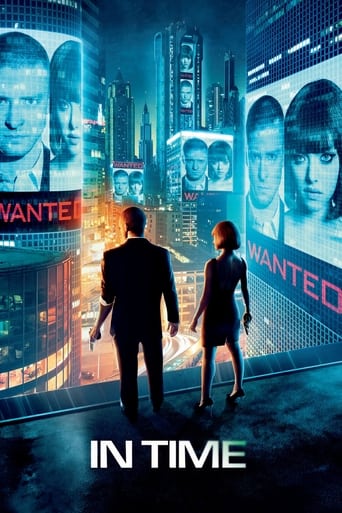jormatuominen
Now hold on. This is supposed to be sci-fi, but instead of futuristic computer generated images what you get is cars, clothes and buildings made no later than the 1970´s or the early 1980´s at latest. The film takes place in 23rd century so what do we see here? In all likelihood this is what the writer-director Andrew Niccol had in mind. While taking place in the future, the entire film is made as if it was made way back in the past. Shot digitally it doesn´t look it. Slightly grainy look and reddish-brown, sometimes bluish coloration is just as if the whole thing had been shot in the early or mid seventies 16 or 35 mm film now aged and discolored. Same goes for editing, camera angles, the chase scenes, acting style and so on as well. The clothes, furniture and even the cups the characters drink from are from the sixties. Significantly there are no computers, no electronic devices hand-held or otherwise and no electronic displays of any kind in the film. The exceptions are the silly fluorescent remaining lifetime displays everyone has on their arms. The cars are supposedly souped-up with electrical engines but they sound more like the electrical toy cars of the sixties. Stylistically, if this was a film from the early seventies by say Kubrick of the Clockwork Orange period or Michael Crichton of the Andromeda Strain period, the only unusual aspect would be the novel basic idea of using remaining lifetime used as currency instead of money. In 2011 terms the plot may be simplistic at times but in 1971 the whole thing would have been really far out, man, cutting edge sci-fi. Obvious homage is being paid to Arthur Penn´s Bonnie and Clyde, the major film of the period about people on borrowed time. I thoroughly enjoyed my two-way time trip and the core matter of the plot, thought-provoking, utterly brutal economics of time running out, more deadly than money. A good reminder of one´s mortality, too, and that is more than most films have to offer. A satisfying film for a long-time movie freak but I do understand that it would be baffling for the uninitiated who see the dots but do not register the connections.
welshnew50
Although with a protagonistic-enough premise, and some genuine intent to realize a sci-fi setting,this movie takes too much from who's-got-the-power film traditions mostly from the USA Italy/similar cinema, with far too much time spent with wanting to prove a point at the end of a gun chit-chat 'patient' with otherwise-mortal, enemies.if that's enough to turn you off, don't bother, you'll find that unnecessary and getting in the way of plot progression and more in depth character-development, or similar.if you've more patience to see it through, there is more character than the worst of such movies of the last decade or so - it does do better than many, when there being a consistent enough motivation-background, for you to not need to appreciate every minor point about the characters' perspectives / opportunities , to see things through their eyes, to be able to find it a good stimulation of the edge of acceptabilities, of many of the impositional/societal -themes portrayed in it.Unfortunately, there are also some unnecessary simplifications OF CHOICE, and only-absolute-isms of-choice, that could've been written better, although to its credit, they were probably in the original novel/story.One in particular, simplified for off-screen purposes, a absolute-ism that would be false were such a choice upon us. in one scene near the end, a clashing of forces behind the reasons of the two main characters, and the father of one of them, (the father a conspirator/willing collaborator with the system dominating human life in the setting , a truly hated character) ,.....doesn't really nail the more clearly self-interested , or vampiric nature of the situation, or reasons for one policy compared to another-slightly-different, and one that would be much more believable, that makes the setting and plot a little silly to begin with, (but given the choice of the writers, to make it absolute with it's money-parallel dynamic, actually works well if you don't OVER-think it).so i don't mind doing a spoiler. Sphhhhhhtt! :)basically, there is MEANT to be a argued prevention-argument for the tech in the forced situation, but at this particular scene, the father makes it quite clear that this system is for "a few", to live forever, become immortal, etc.Although these are valid themes or language used to describe living indefinitely, the writing was sloppy and less actually discerning than it might have been, were people in such a situation truly aware of what really mattered in the inequality.whether or not a person would use the word immortal, SPECIFICALLY/divine, etc, seemed inserted.more important, than the inequality, that is meant to be intrinsically a part of the mechanism of HOW, the imposed-system works.instead, they went with the high-ER sensitivity value, and the question of agelessness -opportunity compared to mortality, was BLURRED.typical.instead of making the two ideas separate ( agelessness , and immortality (when agelessness does NOT have to mean immortality from being killed, accidents, etc...) ) , they were on ONLY one side of the two arguing-parties arguments, instead of STILL on both.that simplification, avoids somewhat clumsily, the question of agelessness/things like wisdom / awareness of the need for cooperation and balance, that the elder get, when speaking of what society SHOULD.BEFORE, thinking about policy/measures UPON, oneself/one's own, etc.that's not to say, that the word/subject, sacrifice, should not, have been used or anything- quite the contrary, if i sound like someone who avoids ALL religious terms.Im trying to say that although concepts like no-immortality WERE used from a perspective of risk in our history, agelessness, UNlike the money-parallel dependency in this movie, should not be misnomer-ed.when it could do a lot of good. for instance, the ageless, could be bound to a lot of constraints - limits on ANY kind of asset ownership or wealth; OR access to no Al Capone access-to friends-assets; children -limit; to have to remain inoculated and checked for any contagious diseases etc.and THEN,.. be reliable where their freedoms were limited, but they could choose to exist perpetually, eventually, inevitably realizing the greater potentials for co-operation/constructivism, compared to destruction.-----------------------a BROADER base of a plot like that, makes for a much more believable plot and less seeming fudged, blurred, RANGE of dynamics in it, instead of a false pretense of only one issue or only one dynamic, etc."which plot mechanism, do you think was the most motivating, in this movie, children?", one might ask, without stopping and thinking, what's the point in asking them to choose ONLY one?-----------------Motivations work in concordance, or in harmony, or in at least motivation-parallels.the money-parallel, was a good one - it worked well, in this movie.======================if they'd tried being more CLASS WARFARE about it, instead of 'PERSONAL', then everyone wanting to personally ASSERT themselves, needing a gun to be able to...it would not have ended up the dolling up / action-manning up, of two characters that could've had more, mmmm,emotional-conflicts, rather than 'RELIABLE' moral-motivations.especially the female main character. dolled up would be putting it mildly. that's all she needs?neo french-chic / Russian-doll platform wearing secret agent rubbish, one might say. the character, as was supposed to be a SENSITIVE, emotionally responsive, adult?too much was on the main male character, whose motivations and emotions were much more determined / clear-cut.with the much greater potential for her character's conflicts, to be in the spotlight, instead of the spoilt-child-fashion-nightmare, she was a wasted opportunity.
fredd12
I just saw "In Time" again for the third time or so, and it's my new favorite movie. It's hard science-fiction, much harder than most. The future doesn't look like "the future" at all, but more like the 1970s. The cops drive 1970 Dodge Chargers, not goofy electric golf- carts. There are phone booths, no cell phones, and the Internet is not a major force in anyone's life. No one is emigrating to Mars, as in "Gattaca (1997)" -- also written by Andrew Nicol -- and there are certainly no star-ships, and no space aliens. The single technology that has gone forward is medicine, and that life clock thing, naturally. "No one dies; no one gets sick." That's the thing that makes it "hard" science-fiction; it resists throwing a bunch of stuff on the wall, instead holding tightly to its premise. Because of the immortality-with-a-price premise and the 1970s action-movie styling, comparisons to "Logan's Run (1976)" are unavoidable. Whereas "Logan's Run" envisioned a future where we got everything we ever wished for, only to see it wind down, "In Time" envisions a sort of stagnant future that one rarely imagines in a movie, not even obviously dystopian, just stagnant. This is what I love about the movie: it's not really about immortality at all, but about Economic Fascism. In the movie, people have jobs making widgets, making just enough to live day to day. Prices are methodically inflated so that no one gets ahead. There's no upward mobility whatsoever. It's like "1984", except Economics (with the help of that clock thing) does all the work of the secret police. It's a metaphor for our modern post-2008-crash economy. This movie reminds me a bit of "The Island (2005)", which I also liked, a big difference being that there's no "secret". The characters in "In Time" tacitly consent to their situation. This is a fast-paced, beautiful action-adventure science-fiction film with a brilliant premise, destined to be a cult classic. Hollywood, please make more movies like this.





